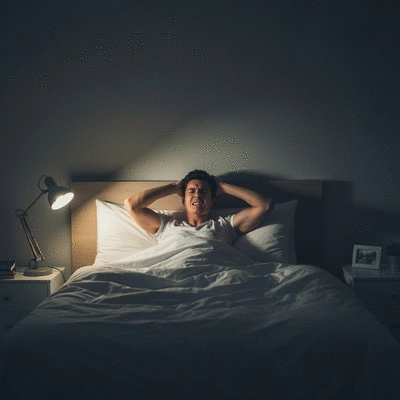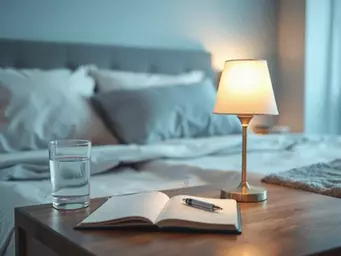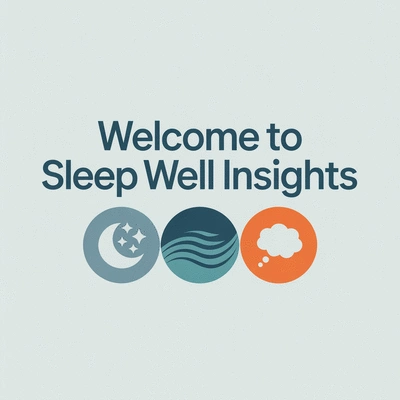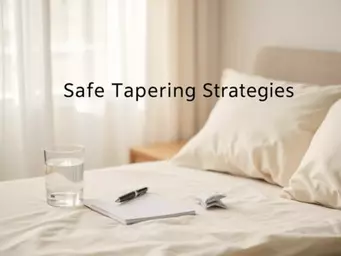Understanding the intricate connections between anxiety, stress, and insomnia can be the key to unlocking a peaceful night's sleep. Through this exploration, we uncover actionable insights that can transform your sleep quality.
What You Will Learn
- The cycle of anxiety and insomnia: Anxiety can exacerbate insomnia, leading to a vicious cycle that affects overall well-being.
- Impact of stress on sleep: High-stress situations can trigger anxiety, making relaxation and restful sleep more difficult to achieve.
- Role of hyperarousal: A heightened state of alertness can impede your ability to fall asleep and stay asleep, resulting in poor sleep quality.
- Neurotransmitters and sleep: Balancing neurotransmitters like GABA and cortisol is vital for promoting better sleep and reducing anxiety levels.
- Practical strategies: Establishing a consistent sleep schedule and incorporating relaxation techniques can significantly improve your sleep quality.
The Interconnected Cycle of Anxiety, Stress, and Insomnia
This visual illustrates the cyclical and bidirectional relationship between anxiety, stress, and insomnia, highlighting key causes and proposed solutions.
Bidirectional Relationship
Anxiety, stress, and insomnia form a feedback loop where each factor exacerbates the others. Poor sleep worsens anxiety, and high anxiety makes sleep elusive.
Neurotransmitter Dysregulation
Cortisol (stress hormone) disrupts sleep by hindering GABA's (relaxation neurotransmitter) calming effects.
Hyperarousal & Sleep Impact
Heightened physiological tension (hyperarousal) leads to longer sleep latency and increased nighttime awakenings.
Holistic Approach to Solutions
Integrating stress management, relaxation techniques (4-7-8 breathing), and consistent sleep schedules can break the cycle.
Key Actionable Steps
- Consistent sleep schedule
- Relaxation techniques
- Limit stimulants
Understanding the Complex Relationship Between Anxiety, Stress, and Insomnia
Have you ever noticed how a racing mind can turn a cozy bed into a battleground? The connection between anxiety, stress, and insomnia is complex, and understanding this relationship is crucial for anyone struggling to get a good night's sleep. It's not just about counting sheep; it’s about grasping how our mental state can hold the key to unlocking better sleep quality!
In my work at Sleep Well Insights, I’ve seen how the interplay of these factors can keep many of us trapped in a cycle of sleeplessness. Let's dive deeper into how anxiety and stress interact to affect our sleep.
How Anxiety and Stress Interact to Affect Sleep Quality
Anxiety and stress can act like two sides of the same coin, each exacerbating the other and leading to insomnia. This interaction can create a feedback loop that feels impossible to break. For instance, when you're stressed, your body releases hormones that heighten anxiety, which in turn can make it harder to relax and fall asleep.
- Stress triggers anxiety: Situations like work deadlines or personal challenges can lead to heightened anxiety, making it difficult to unwind in the evening.
- Anxiety disrupts sleep: Worries can keep your mind racing, resulting in less time spent in restorative sleep stages.
- Insomnia increases stress: A lack of sleep can lead to greater stress, creating an endless cycle.
Recognizing these interactions is the first step toward finding effective strategies to improve your sleep.
The Bidirectional Nature of Anxiety, Stress, and Insomnia
The relationship among anxiety, stress, and insomnia is truly bidirectional. When you're anxious, sleep becomes elusive, and when you don’t sleep well, your anxiety can worsen. This cycle often leads individuals to feel trapped, unsure of how to regain control. By acknowledging this pattern, we can start to identify interventions that help break this cycle! Research highlights this complex interplay, demonstrating that insomnia and anxiety frequently co-occur and reciprocally influence each other's severity, as detailed in an article by the National Institutes of Health.

Simple practices, such as mindfulness and relaxation techniques, can help reduce anxiety, paving the way for better sleep. Remember, you’re not alone in this struggle—many people experience similar challenges.
How Hyperarousal Impacts Sleep Latency and Duration
Hyperarousal is a state of heightened psychological and physiological tension that can seriously impact your sleep. When your body is in hyperarousal, it’s ready for fight-or-flight response, making it difficult to relax, fall asleep, or stay asleep. This state can lead to longer sleep latency—meaning it takes you longer to fall asleep—and shortened sleep duration. The concept of hyperarousal is further explored in a study on the neurobiological mechanisms of sleep disruption in conditions like post-traumatic stress disorder, found in Frontiers in Psychiatry.
- Difficulty relaxing: With hyperarousal, your body remains in a state of alertness, pushing sleep further away.
- Nighttime awakenings: Even when you do fall asleep, you might wake up frequently, disrupting your sleep cycles.
- Increased restlessness: This can make the sleep quality poorer, leaving you feeling exhausted upon waking.
Understanding hyperarousal is vital for developing effective strategies to calm your mind and body, setting the stage for a restful night.
The Neurobiological Mechanisms Behind Sleep Disruption
Understanding the neurobiological mechanisms at play can shed light on why anxiety and stress have such profound effects on sleep. Our brains are complex, and the interactions between neurotransmitters and stress hormones play a pivotal role in our ability to sleep.

At Sleep Well Insights, we aim to clarify these processes so you can better understand how to manage them.
Neurotransmitter Dysregulation: The Role of GABA and Cortisol
Neurotransmitters like GABA and stress hormones like cortisol are key players in the sleep process. GABA is an inhibitory neurotransmitter that promotes relaxation and sleep, while cortisol, released during stress, can disrupt this balance. When cortisol levels are elevated, GABA’s calming effects can be hindered, making it harder to fall asleep.
- GABA's calming influence: Adequate GABA levels help you wind down and feel sleepy.
- Cortisol's disruptive effect: High cortisol levels can keep you alert and awake, delaying the onset of sleep.
- Finding balance: Strategies to manage stress and anxiety can help restore balance to these neurotransmitters, improving your sleep.
Recognizing this dynamic is crucial for anyone eager to reclaim restful nights and rejuvenated days.
Exploring the Cholinergic System and Brain Networks Overlap
The cholinergic system, which involves the neurotransmitter acetylcholine, is also critical for sleep regulation. It interacts with various brain networks responsible for arousal and sleep. A disruption in these networks can lead to difficulties in transitioning between sleep stages, further complicating insomnia. Further research into the neural mechanisms underlying sleep and wakefulness, such as that published in Nature Scientific Reports, provides a deeper understanding of how these systems overlap and influence sleep quality.
Understanding how these systems overlap offers insight into potential treatment avenues. By addressing imbalances in the cholinergic system, we can work toward more restful nights.
Quick Summary
Here's a brief recap of the key points discussed so far:
- The interplay between anxiety, stress, and insomnia creates a challenging cycle that affects sleep quality.
- Understanding hyperarousal and its impact on sleep latency and duration is key to improving rest.
- Neurotransmitters like GABA and cortisol play significant roles in the sleep process and can be managed through effective stress reduction strategies.
Summarizing the Interconnectedness of Anxiety, Stress, and Insomnia
As we explore the intricate web tying together anxiety, stress, and insomnia, it becomes clear that these elements profoundly impact one another. Understanding this interconnectedness is crucial for developing effective strategies to improve sleep quality. Anxiety often escalates stress, leading to a cycle that keeps us awake at night, while stress can heighten feelings of anxiety, further complicating our relationship with sleep. Recognizing this dynamic is the first step in addressing the root causes of sleeplessness.
Key takeaways from our discussion include:
- The bidirectional relationship between anxiety and insomnia, where one influences the other.
- Neurobiological factors at play, including neurotransmitter dysregulation.
- The importance of addressing both mental health and sleep hygiene for overall well-being.
By summarizing these points, we can better grasp how important it is to tackle both anxiety and insomnia simultaneously. This is not just about getting more sleep; it's about enhancing quality of life through holistic approaches.
Actionable Steps for Improving Sleep Quality Amid Anxiety and Stress
Now that we understand the relationship between anxiety, stress, and insomnia, let's focus on actionable steps you can take to enhance your sleep quality. Here are some practical strategies that can make a significant difference:
- Implement a consistent sleep schedule to regulate your body's internal clock.
- Incorporate relaxation techniques such as deep breathing or progressive muscle relaxation before bedtime.
- Create a calming bedtime routine that signals to your body that it's time to wind down.
- Limit caffeine and stimulants, especially in the afternoon and evening.
These steps can help create a more conducive environment for sleep, reducing the influence of anxiety and stress. Remember, every small change can lead to significant improvements in how you feel and sleep!
Encouraging a Holistic Approach to Mental Health and Sleep
Your Path to Better Sleep: Integrating Stress Management Techniques
At Sleep Well Insights, we believe in a holistic approach to managing insomnia. It's essential to integrate stress management techniques into your daily routine. This helps not only with sleep but also with mental clarity and emotional resilience. Consider exploring methods such as:
- Mindfulness meditation to cultivate awareness and reduce stress.
- Regular physical activity to release endorphins and promote relaxation.
- Journaling to process thoughts and emotions, alleviating mental burdens.
By weaving these practices into your life, you can create a supportive framework for improved sleep and well-being!
Exploring Relaxation Techniques: Breathing Exercises and Mindfulness Practices
Relaxation techniques can be incredibly effective tools in managing anxiety and insomnia. Simple practices like breathing exercises and mindfulness meditation can lower stress levels and promote restful sleep. Here are a few techniques that you can easily incorporate:
- The 4-7-8 breathing technique: Inhale for 4 seconds, hold for 7 seconds, and exhale for 8 seconds.
- Guided imagery, where you visualize a peaceful scene, can help calm your mind.
- Mindfulness apps offer guided meditations to help you focus and relax.
These strategies can significantly enhance your ability to relax and prepare for sleep, making them vital components of your nighttime routine!
Inviting Further Discussion and Sharing Personal Experiences
As we wrap up this section, I invite you to reflect on your own experiences with anxiety, stress, and sleep challenges. Have you found particular strategies that work for you? Sharing personal stories can foster a supportive community where we can learn from each other. Feel free to comment or reach out—we're here to listen and provide guidance on your journey to better sleep!
Frequently Asked Questions (FAQs)
What is the relationship between anxiety, stress, and insomnia?
Anxiety, stress, and insomnia form a bidirectional feedback loop. Anxiety can disrupt sleep, leading to insomnia, which in turn can worsen anxiety and stress levels. Stress can also trigger anxiety, making it harder to relax and fall asleep.
What is hyperarousal and how does it affect sleep?
Hyperarousal is a state of heightened physiological and psychological tension. It keeps the body in a "fight-or-flight" mode, making it difficult to relax, fall asleep (longer sleep latency), and stay asleep (frequent nighttime awakenings), ultimately leading to poor sleep quality.
How do neurotransmitters like GABA and cortisol influence sleep?
GABA is a neurotransmitter that promotes relaxation and sleep. Cortisol, a stress hormone, can disrupt this balance. Elevated cortisol levels can hinder GABA's calming effects, making it harder to initiate and maintain sleep.
What are some actionable steps to improve sleep quality when dealing with anxiety and stress?
Actionable steps include maintaining a consistent sleep schedule, incorporating relaxation techniques (like deep breathing or progressive muscle relaxation), creating a calming bedtime routine, and limiting stimulants like caffeine, especially in the evening.
What relaxation techniques can help with anxiety and insomnia?
Effective relaxation techniques include the 4-7-8 breathing technique (inhale 4s, hold 7s, exhale 8s), guided imagery (visualizing peaceful scenes), mindfulness meditation, and using mindfulness apps for guided relaxation.
Recap of Key Points
Here is a quick recap of the important points discussed in the article:
- Anxiety and stress have a bidirectional relationship that can lead to insomnia.
- Understanding neurobiological mechanisms, including neurotransmitter dysregulation, is crucial for sleep quality.
- Implementing relaxation techniques and mindfulness can significantly improve sleep quality.
- Creating a calming bedtime routine and maintaining a consistent sleep schedule are vital for enhancing sleep hygiene.
- Holistic approaches to managing stress and anxiety can contribute to better overall well-being and sleep quality.








